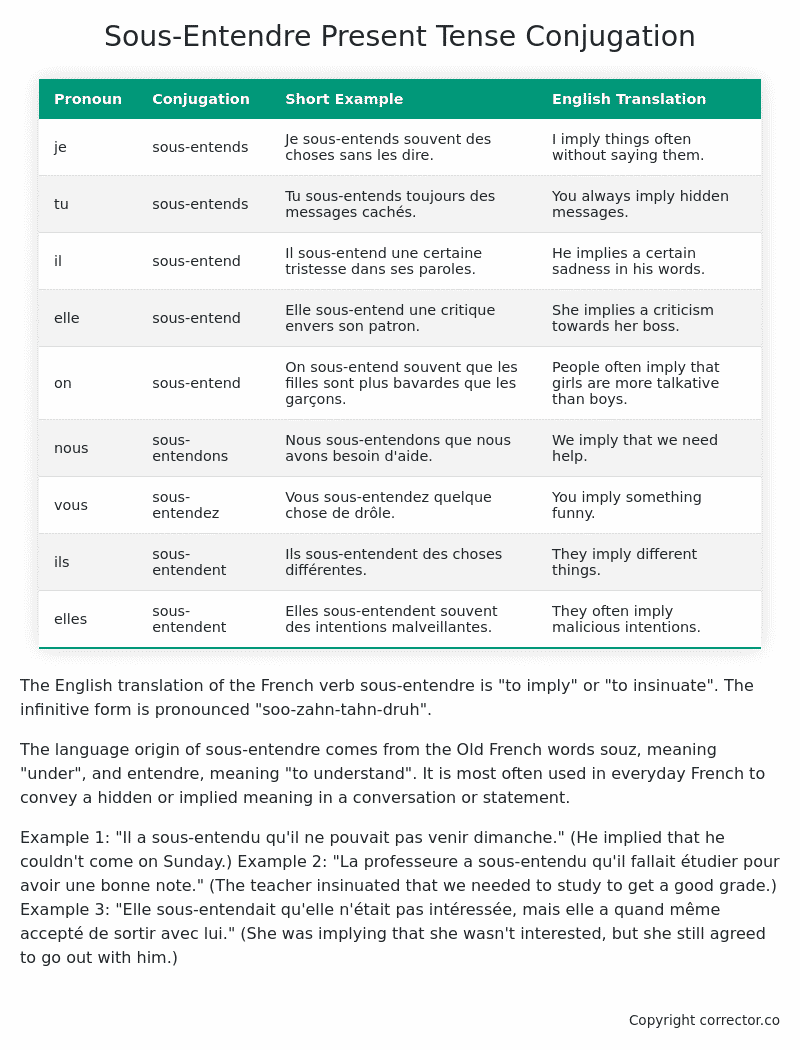Le Present (Present Tense) Conjugation of the French Verb sous-entendre
Introduction to the verb sous-entendre
The English translation of the French verb sous-entendre is “to imply” or “to insinuate”. The infinitive form is pronounced “soo-zahn-tahn-druh”.
The language origin of sous-entendre comes from the Old French words souz, meaning “under”, and entendre, meaning “to understand”. It is most often used in everyday French to convey a hidden or implied meaning in a conversation or statement.
Example 1: “Il a sous-entendu qu’il ne pouvait pas venir dimanche.” (He implied that he couldn’t come on Sunday.)
Example 2: “La professeure a sous-entendu qu’il fallait étudier pour avoir une bonne note.” (The teacher insinuated that we needed to study to get a good grade.)
Example 3: “Elle sous-entendait qu’elle n’était pas intéressée, mais elle a quand même accepté de sortir avec lui.” (She was implying that she wasn’t interested, but she still agreed to go out with him.)
Sous-Entendre – About the French Present Tense
To take a deep dive into all the French tenses then see our article on Mastering French Tense Conjugation.
Common Everyday Usage Patterns For Le Present
Interactions with Other Tenses
Table of the Present Tense Conjugation of sous-entendre
| Pronoun | Conjugation | Short Example | English Translation |
|---|---|---|---|
| je | sous-entends | Je sous-entends souvent des choses sans les dire. | I imply things often without saying them. |
| tu | sous-entends | Tu sous-entends toujours des messages cachés. | You always imply hidden messages. |
| il | sous-entend | Il sous-entend une certaine tristesse dans ses paroles. | He implies a certain sadness in his words. |
| elle | sous-entend | Elle sous-entend une critique envers son patron. | She implies a criticism towards her boss. |
| on | sous-entend | On sous-entend souvent que les filles sont plus bavardes que les garçons. | People often imply that girls are more talkative than boys. |
| nous | sous-entendons | Nous sous-entendons que nous avons besoin d’aide. | We imply that we need help. |
| vous | sous-entendez | Vous sous-entendez quelque chose de drôle. | You imply something funny. |
| ils | sous-entendent | Ils sous-entendent des choses différentes. | They imply different things. |
| elles | sous-entendent | Elles sous-entendent souvent des intentions malveillantes. | They often imply malicious intentions. |
Other Conjugations for Sous-Entendre.
Le Present (Present Tense) Conjugation of the French Verb sous-entendre (this article)
Imparfait (Imperfect) Tense Conjugation of the French Verb sous-entendre
Passé Simple (Simple Past) Tense Conjugation of the French Verb sous-entendre
Passé Composé (Present Perfect) Tense Conjugation of the French Verb sous-entendre
Futur Simple (Simple Future) Tense Conjugation of the French Verb sous-entendre
Futur Proche (Near Future) Tense Conjugation of the French Verb sous-entendre
Plus-que-parfait (Pluperfect) Tense Conjugation of the French Verb sous-entendre
Passé Antérieur (Past Anterior) Tense Conjugation of the French Verb sous-entendre
Futur Antérieur (Future Anterior) Tense Conjugation of the French Verb sous-entendre
Subjonctif Présent (Subjunctive Present) Tense Conjugation of the French Verb sous-entendre
Subjonctif Passé (Subjunctive Past) Tense Conjugation of the French Verb sous-entendre
Subjonctif Imparfait (Subjunctive Imperfect) Tense Conjugation of the French Verb sous-entendre
Conditionnel Présent (Conditional Present) Tense Conjugation of the French Verb sous-entendre
Conditionnel Passé (Conditional Past) Tense Conjugation of the French Verb sous-entendre
L’impératif Présent (Imperative Present) Tense Conjugation of the French Verb sous-entendre
L’infinitif Présent (Infinitive Present) Tense Conjugation of the French Verb sous-entendre
Struggling with French verbs or the language in general? Why not use our free French Grammar Checker – no registration required!
Get a FREE Download Study Sheet of this Conjugation 🔥
Simply right click the image below, click “save image” and get your free reference for the sous-entendre Present Tense tense conjugation!

I hope you enjoyed this article on the verb sous-entendre. Still in a learning mood? Check out another TOTALLY random French verb present conjugation!

